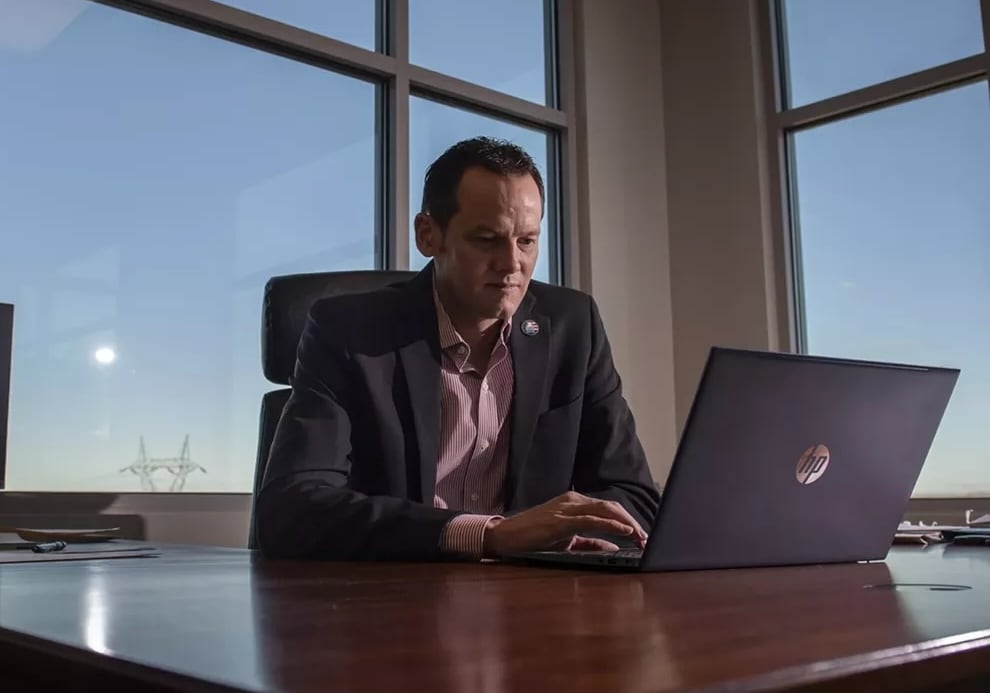Congressman Mike Simpson, a Republican, expects that Idaho could eventually overtake Wisconsin as the country’s second-largest producer of dairy products.
However, he doesn’t believe it can get there without the labor of thousands of undocumented workers who are currently facing deportation from the administration of President Donald Trump and attempts by Idaho lawmakers to prevent them from working.
Three times since 2019, he has introduced legislation in Congress to give these workers a road to citizenship; but, each time, the measures were defeated by opponents within his own party who said they were amnesty for illegal immigrants who were displacing American labor.
Simpson, who represents Idaho’s 2nd Congressional District, told InvestigateWest that Americans will not accept these jobs. Furthermore, the cost of milk products would skyrocket if all dairy workers in Idaho and the rest of the nation were to disappear. I’m not sure how much you’re willing to spend for a gallon of milk.
Simpson is on one side of the gap between demands to deport thousands of undocumented people and the economic reality of Idaho, which heavily relies on migrant labor, as a new administration centered on border politics takes office. Legislators are slated to debate a plan that emphasizes this conflict at the statehouse in Boise: requiring employers to use a federal verification system that verifies workers’ immigration status and cancels business licenses for companies that hire unauthorized workers.
The E-Verify system has garnered favor from those advocating for a border crackdown, but according to population data, it has a patchy record in areas where it has been implemented, failing to apprehend unlawful workers and having little influence on the undocumented population. The initiative has been challenged by dairy farmers and agricultural organizations, who claim it unfairly burdens employers and jeopardizes one of the most significant industries in the state.
Rick Naerebout, executive director of the Idaho Dairymen’s Association, stated at a news conference at the Idaho Capitol in 2024 that “in that case, what you’re doing is putting more onus on employers, when this should be something that should be handled at the border.”
Although Naerebout has collaborated with Simpson on initiatives to give agricultural laborers a route to legal status, he intends to primarily play defense in the Idaho Legislature this year because many members are already working on legislation to stop illegal immigration.
According to studies, at least half of the dairy workers in the United States lack proper documentation. Dairy farmers and other workers in Idaho may lose their employment if an E-Verify bill becomes obligatory.
Mandatory E-Verify is seen by Idaho lawmakers as a concrete step toward addressing the border situation at the state level.
Rep. Jordan Redman, R-Coeur d Alene, who introduced the E-Verify measure last year, told InvestigateWest that he is working on a second try for the current session, saying, “I think we all believe that if you’re going to be working in Idaho, you need to be here legally.”
The number of undocumented workers hasn’t changed much in states where E-Verify is required, according to data, and companies in Arizona still don’t cooperate 100% of the time 16 years after the law was passed.
According to Alex Nowrasteh, vice president of economic and social policy research at the libertarian think tank Cato Institute, the impact on the population of illegal immigrants is minimal. Businesses have to cope with yet another difficulty as a result of the effect of cost increases. Therefore, there’s really no good reason to do it. Actually, the strongest defense of E-Verify is that it isn’t very effective, which enables politicians to speak toughly about illegal immigration without really harming the economy.
Death penalty for businesses
In order to enable businesses to ascertain whether their employees are eligible to work in the United States, Congress established E-Verify in 1996. In 2008, Arizona became the first state to require E-Verify for all companies, warning lawbreakers that their licenses would be revoked. Business owners and civil rights organizations referred to it as the “business death penalty” at the time.
Since then, a few states—including Florida and South Carolina in 2021—have passed legislation requiring E-Verify.
In 2008, the Cato Institute got statistics from U.S. Citizenship and Immigration Services that showed that only 0.8% of Arizona employees who were put through E-Verify were found to be ineligible to work. Since then, fewer workers have been reported through E-Verify; in 2016, only 0.1% of workers were found to be unable to work.
However, according to Nowrasteh, the percentage of undocumented workers in Arizona is far more than less than 1%. People aren’t being flagged by E-Verify: When identifying unlawful workers, E-Verify had a 54% error rate, according to a 2009 government audit.
Additionally, despite the fact that it is necessary, many employers do not use it. In Arizona, 71% of employers used E-Verify as of 2016.
According to Nowrasteh, this is because there aren’t many systems in place to uphold the law.
According to the Wall Street Journal, only two companies in Arizona have had their licenses canceled since 2008 for not using E-Verify.
A bill to impose harsher sanctions on company owners who do not use E-Verify was put forth, but it was unsuccessful. The law would have made infractions a crime and fined businesses $10,000 for each employee they had who was not authorized.
However, that might not have helped either, according to Nowrasteh.
Good luck monitoring your use of E-Verify, Nowrasteh stated. To try to determine exactly what companies are doing using E-Verify, you will need to conduct audits of business records.
According to the Arizona Mirror, Arizona Representative Ben Toma, who introduced the bill last year that would impose harsher fines on companies that do not use E-Verify, stated to a group of other politicians that the law promotes equity for companies that do. The law deters illegal immigration and communicates that Arizona is not a sanctuary state, according to other advocates in the Arizona statehouse.
Since mandating E-Verify, Arizona has experienced a slight decrease in the number of unauthorized immigrants.
According to the Pew Research Center, there were an estimated 350,000 undocumented immigrants in Arizona in 2008; this figure decreased by 7% in 2009, and it has either been the same or has been gradually declining ever since.
However, Pew reports that other states with mandated E-Verify legislation have not experienced the same drop as Arizona. Since requiring E-Verify in 2011, Mississippi’s illegal population has remained largely unchanged. E-Verify was made mandatory in North Carolina in 2013, and the number of people without documentation has not changed much. Georgia and Alabama are no different. Florida’s obligatory E-verify statute was passed in 2021, and Pew data indicates that the state’s undocumented population has recently increased.
According to some politicians, the measure might be sufficient to discourage foreigners from coming to Idaho in search of employment.
E-Verify and other immigration-related laws are about sending a message to undocumented immigrants, Idaho House Speaker Rep. Mike Moyle, R-Star, told InvestigateWest during a news conference at the Capitol earlier this month.
He stated, “I believe there are a few things we can change to ensure the message gets through.” If you do it correctly, we don’t mind, but if you do it incorrectly, there will be repercussions.
Dairies could disappear from Idaho.
Idaho ranks third in the nation for dairy production, behind Wisconsin and California. Idaho dairies employ over 33,000 workers, and around 90% of them are foreign born, according to the Idaho Dairymen s Association.
Idaho companies, including dairy farmers, told researchers from the University of Idaho’s McClure Center for Public Policy Research that they do hire undocumented workers when they are unable to locate authorized workers, though precise numbers on the number of undocumented workers are unknown.
Much of Idaho s agriculture industry relies on the H-2A labor program, which is a federal program that allows employers to bring in foreign labor for seasonal work and return to their home countries after the growing season. But dairy farmers are required to milk cows and tend to the dairy every day, all year-round.
Hernan Tejeda, an economist and researcher at the UI s College of Agriculture and Life Sciences, said dairy work is incredibly difficult and few people want to do it, which is why dairy farmers often rely on undocumented workers.
The wage rate (for dairy workers) is around $18 to $20 per hour, and anybody can just go to McDonald s or be in construction and have a much easier life, Tejeda said. Why would they go and work in a dairy where it s very laborious and you have to be there all day?
Tejeda said to attract American workers, dairies may have to increase wages considerably.
The profit margins are so slim that a sizable increase in wages would not be feasible and the business would be impossible to run, he said.
E-Verify or mass deportations, which have been promised under the Trump administration and supported by Idaho Gov. Brad Little, could jeopardize the workforce that many industries, especially dairies, rely on.
Without an undocumented workforce, Philip Watson, an economist and researcher at the University of Idaho College of Agriculture and Life Sciences, said the state could lose over $900 million in gross domestic product.
Watson said state policies, like mandatory E-Verify, would put Idaho dairies at a disadvantage when it comes to being able to hire workers and produce milk at the rate Idahoans are used to.
The industry has said that it would put it at a competitive disadvantage for having new dairies move in or existing dairies expand their operations, Watson said. There s a point at which dairies would start leaving Idaho, if it was too costly to produce milk relative to some other state.
Under current policy, employers in states that do not have mandatory E-Verify laws must complete an I-9 form for every employee, which requires the employer to examine an employee s work authorization documentation, such as a passport, driver s license, permanent resident card or other forms. But under the Immigrant Employee Rights Act, an employer cannot ask about an individual s legal status.
Proponents of E-Verify saythat using the program gives employers added protection that they do not have if they can t ask about an employee s legal status. They say using E-Verify could shield employers from the civil and criminal penalties of knowingly hiring someone who is unauthorized to work in the U.S.
Immigrants important to Idaho economy
Redman said he is meeting with the Idaho Dairymen s Association and Idaho Farm Bureau to try to work out a way to propose an E-Verify bill without jeopardizing their industries. But there seems to be little middle ground.
We are all strong supporters of border security, Naerebout said during last year s legislative session. That s not in question. If we didn t have an immigrant workforce that worked alongside our dairyman and farmers day in and day out, who are a loyal, dedicated family-oriented group of people and important to Idaho s economy we wouldn t be where we are today.
Moyle said he hopes the dairymen can come to an agreement with lawmakers, but he also said that if they don t, they re going to get run over.
There s a way to do E-Verify with the dairies, he said. Maybe staggering it in to give the federal government time to either react or for the dairies to find alternatives.
But Simpson wants the Legislature to pump the brakes.
I think it s important that the Legislature hold off, he said. I understand what they re trying to do and why they re trying to do it, but there are secondary consequences that they need to be aware of.
— Rachel Spacek, InvestigateWest
InvestigateWest (investigatewest.org) is an independent news nonprofit dedicated to investigative journalism in the Pacific Northwest. Reporter Kaylee Tornay covers labor, youth and health care issues. Reach her at 503-877-4108,[email protected] on X@ka_tornay.



